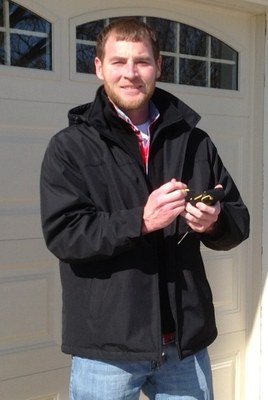Student Spotlight December 2014
Jeremy Sandifer

Jeremy Sandifer graduated high school in 2001 in a very small town located in northern Louisiana. Over the next 8 years, he was in and out of college while working full time as home improvement contractor in places such as Murfreesboro, TN and New Orleans, LA. Jeremy was ultimately able to commit to school full time and received his B.S. in Applied Geography here at University of Louisville in 2012. After graduation, Jeremy decided to continue his education at UofL and is now working towards his M.S. in Applied Geography.
I always heard good things about UofL. It helped that they are research driven and have an increasingly high profile thanks to those efforts, not to mention, the success of the athletic departments. Go Cards!!
Currently, I am researching the spatial and temporal distribution of the Urban Heat Island effects throughout the U.S. and how Louisville/Jefferson County compares to other metropolitan areas. Urban heat is an important predictor of quality of life in urban places. This research is a prelude to determining the mix of factors that contribute most to increases in urban heat. Geographic information systems (GIS) and satellite remote sensing are invaluable technologies that make this type of comparative research possible.
I hope to see where the ‘hottest’ cities are and why that may be the case.
Spatial science makes use of technology driven tools that are applicable to any problem or issue that varies over space or time. This is my way of contributing to the resolving of issues we have as an increasing urban and global society.
Sandifer, J. 2013. Influence of Surface Land Cover on the Urban Heat Island Intensity within Metropolitan Jefferson County, Kentucky. Papers in Applied Geography Vol 36, pp. 323-331. http://applied.geog.kent.edu/AGCPapers/2013/P323-331/index.html
Sandifer, J. and Mountain, K. 2013. Remote Sensing and Identifying the Urban Heat Island from Space: An Overview. Sustain Magazine Vol 29. The Kentucky Institute for the Environment and Sustainable Development. University of Louisville. Louisville, KY. pp. 9-12. http://louisville.edu/kiesd/sustain-magazine/SUSTAIN-29rev.pdf
The training I’ve received at UofL has given me the tools to participate in a wide range of problem solving activities; from simple mapping exercises to full-scale geo-spatial analysis that can help shed light on our most difficult issues. The challenge is getting this information into the hands of the decision makers.
The end game is connecting the general public to actionable information that can be generated using geo-spatial methods. Using web technology and open-source programming languages, it is possible for everybody to have access to this kind of information, regardless of education or access to financial resources. Participation in the Kentucky Geographic Alliance (KGA) is one step towards making this happen.
Most rewarding experience was serving as undergraduate teaching assistant and helping students achieve their goals within the Department of Geography and Geosciences.
Being exposed to the wide range of issues pursued by the faculty and the diversity of the techniques that they employ to achieve solutions.
Besides the obvious financial considerations, I would say the greatest challenge in the graduate environment is time management. It is important to participate in as many projects as possible, but be careful to not over-commit your time for fear of letting down those you aim to serve.
Fun Facts
A talent you have always wanted: playing the guitar
Favorite book: Cadillac Desert: The American West and its Disappearing Water (1993)
Favorite quote: “Defeat is not the worst of failures. Not to have tried is the true failure.” George Woodberry
Role Model: Single Moms
Favorite Vacation Destination: There’s plenty to do right here in Louisville!
If you weren’t in graduate school, what would you be doing now? Applying to enroll.
